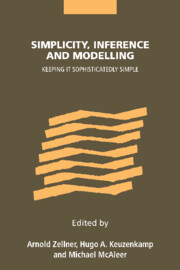Book contents
- Frontmatter
- Contents
- List of figures
- List of tables
- List of contributors
- 1 The enigma of simplicity
- PART I The importance of simplicity
- 2 What is the problem of simplicity?
- 3 Science seeks parsimony, not simplicity: searching for pattern in phenomena
- 4 A macroeconomic approach to complexity
- 5 The new science of simplicity
- 6 What explains complexity?
- 7 Occam's bonus
- PART II Simplicity in theory and practice
- Index
7 - Occam's bonus
Published online by Cambridge University Press: 22 September 2009
- Frontmatter
- Contents
- List of figures
- List of tables
- List of contributors
- 1 The enigma of simplicity
- PART I The importance of simplicity
- 2 What is the problem of simplicity?
- 3 Science seeks parsimony, not simplicity: searching for pattern in phenomena
- 4 A macroeconomic approach to complexity
- 5 The new science of simplicity
- 6 What explains complexity?
- 7 Occam's bonus
- PART II Simplicity in theory and practice
- Index
Summary
The year of the Tilburg Conference on Simplicity, 1997, coincided with the twenty-fifth anniversary of the publications of three classic contributions to the literature on the concerns of the conference (Akaike, 1973; Edwards, 1972; Nelder and Wedderburn, 1972). Taking my book Likelihood first (Edwards, 1972), it contains a section headed ‘Simplicity’ which may still serve to introduce the problem:
We seek scientific laws that adequately account for what we have observed in the belief that, next time a similar situation arises, they will account for what we then observe. We formulate our laws in probability terms because there is always a residuum of uncertainty in our predictions; and we weigh our laws in likelihood terms because there is always a residuum of uncertainty about them. Ramsey (1931) wrote ‘In choosing a system we have to compromise between two principles: subject always to the proviso that the system must not contradict any facts we know, we choose (other things being equal) the simplest system, and (other things being equal) we choose the system which gives the highest chance to the facts we have observed. This last is Fisher's “Principle of Maximum Likelihood”, and gives the only method of verifying a system of chances.’ It is the inequality of ‘other things’ to which we must now pay attention.
- Type
- Chapter
- Information
- Simplicity, Inference and ModellingKeeping it Sophisticatedly Simple, pp. 128 - 132Publisher: Cambridge University PressPrint publication year: 2002
- 1
- Cited by



